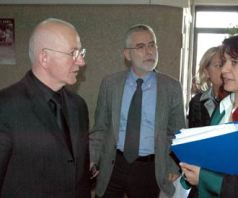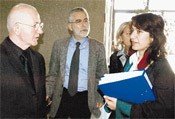The Supreme Court of Appeals upheld the acquittal of Prof. Dr. İbrahim Kaboğlu, the former head of the Human Rights Advisory Board of the Prime Ministry (BIHDK) and Prof. Dr. Baskın Oran, the head of the subcommittee of the same board. Attached to the Prime Ministry, the Board was established to give civil society a say in efforts to improve Turkey’s human rights record. Both Kaboğlu and Oran were accused of “Inciting hatred and hostility among people” for proposing the “Türkiyelilik” concept in the Minority Rights and Cultural Rights Report, which was penned by them and accepted by the Board on October 1, 2004. Not easily translatable, the term “Türkiyelilik” means being from Turkey, which was construed by nationalist circles as an unacceptable departure from the already established term of Turk, a term with strong ethnic connotations.
On May 10, 2006, Ankara's 28th Criminal Court dropped the Article 301 charge, following the reply by the Justice Ministry that the conditions for the trial for “denigrating Turkishness” had not materialized, and ruled that the defendants were to be acquitted of the Article 216 charge, “inciting hatred and hostility among people” as well.
Investigating the appeal, the Supreme Court of Appeals 8th Penal Circuit overturned the acquittal decision regarding the Article 216 charge, ruling that the corporeal and incorporeal conditions of the crime existed.
When the Chief Prosecutor at the Supreme Court of Appeals objected to the acquittal decision, the file came on the agenda of the Court of Appeal’s Plenary Penal Committee. On its April 28 meeting, the Plenary Committee ruled to confirm the acquittal decision of the court. As a result of this decision, Kaboğlu and Oran’s acquittal finally became definite.Kaboğlu: The decision will form a precedent for the courts
Kaboğlu described the outcome of the confirmation of the acquittal decision as a very important gain for the freedom of expression and discussion.
Explaining that the decision was a first example of its kind for the Plenary Committee of the Supreme Court of Appeals Circuits from the perspective of Article 216, Prof. Kaboğlu said that this decision was an important precedent for all the judiciary organs, including the Supreme Court of Appeals.
“The injustice brought about by the four-year-long trial ended”
Stating that the decision ended the enormous injustice brought about by the four-year-long trial, Kaboğlu stated that he wished this would contribute to the human rights and democracy, emphasizing how it also meant for the users of the freedom of expression that creating an arbitrary thought crime was not possible.Kaboğlu also indicated that this decision was a definite warning for the government as well, for it constantly violated the Code 4643 by not calling the İHDK to meet following the litigation, adding that the outcome should also be taken into consideration in the case of Article 301, which he claimed should be annulled. (EÖ/TB)

















